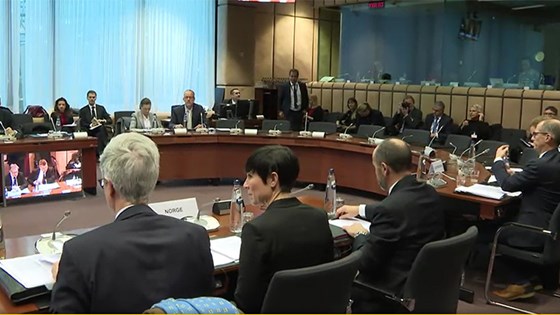Innlegg på møte i EØS-rådet
Historisk arkiv
Publisert under: Regjeringen Solberg
Utgiver: Utenriksdepartementet
Tale/innlegg | Dato: 19.11.2019
Av: Tidligere utenriksminister Ine Eriksen Søreide (Brussel, 19. november)
Utenriksminister Ine Eriksen Søreides innlegg under møtet i EØS-rådet i Brussel 19. november.

Dear Chairs, dear colleagues,
Developing the Single Market further is a priority for Norway. It has served us well for the past 25 years, and to keep it that way we need to make sure that the EEA Agreement remains fit for purpose.
***
The recently issued comment by the EEA Efta States illustrates our desire to contribute constructively to the coming EU legislative cycle.
We share many of the incoming Commission’s ambitions for the future of the Single Market.
A strong Europe and a well-functioning Single Market relies on better regulation, implementation and enforcement of existing rules.
Norway trusts Ursula von der Leyen and her team to continue this important work.
***
Before moving on to how we should improve the Single Market, it is helpful to remind ourselves why the Single Market is so important.
Market access is central. But the agencies, rules and regulations that make up the Single Market are about much more than access to a unified European marketplace.
Equally important, they provide rights and freedoms to our citizens. These rights often surpass what any single country would be willing to grant on a unilateral basis. They include the rights to travel, live and work wherever you choose – without facing discrimination.
Some might have come to take these opportunities for granted.
And it is clear that we still have to work hard to make sure these rights are respected.
This is at the heart of the critical situation regarding social security payments that we have seen unfold in Norway in the last few weeks. The rights of residents to receive certain types of social benefits during stays in other EEA countries have been wrongfully applied.
The government is investigating individual cases and decisions with the aim of rectifying these wrongs, and to ensure correct application of the Regulation in the future. An independent commission has been established to uncover how these mistakes were made.
Turning back to the achievements of the Single Market, I will also highlight that it protects our consumers from monopoly prices, limited choice and unsafe products. It provides education and employment opportunities for students and job seekers.
There is no doubt that these freedoms are the principal achievements of the first quarter-century of the Single Market.
Let me elaborate on some sectors we should work to strengthen: Services and digitalization, competition policy, and sustainability.
***
First, the Services Directive needs an improved notification procedure. A new procedure should require a standstill for comments while legislation is being prepared at the governmental level.
Of course, the procedure has to be designed to avoid administrative burdens on local municipalities or other public authorities. The goal is transparency and predictability for all.
When it comes to financial services, it is important that regulatory homogeneity be ensured across the Single Market.
Norway encourages additional action and information exchange in the area of fin-tech (finanical technology) and sustainable finance. The democratization of finance will be an important step in combatting inequality going forward.
Second, Norway remains concerned with certain aspects of the EU’s competition policy.
We wish to be in line with the EU’s enforcement framework going forward, but there is still an inconsistency regarding the enforcement of EU and EEA competition rules.
The reason is that we have yet to agree on a legal basis for cross-pillar decentralised enforcement. I hope to see progress on this point in the future.
When further developing the Single Market for services, we believe that the following should be on top of the agenda:
Preventing and combating unfair competition, irresponsible working conditions, social dumping and fighting work-related crime.
This will ensure that the Single Market not only provides more jobs at any cost, but good jobs for hard-working and law-abiding citizens.
Increased cross-border cooperation is required to manage these challenges responsibly. The newly created European Labour Authority should play an important role in this work.
Unfair competition within the road transport market is of special concern to Norway. The proposed legislation for the road sector included in the Mobility Package should promote traffic safety, social rights and a more level playing field in the market.
Last, but not least, I would like to turn to sustainability:
Norway supports strengthened European cooperation on environmental issues. Climate change is the greatest challenge of our time, and our citizens demand decisive action.
The EU Emissions Trading Scheme should be maintained as the main mechanism to encourage the industry to reduce carbon emissions.
Luckily, the energy transistion in Europe is underway. Europe must increase its reliance on renewable energy, create more efficient energy markets and develop sufficient capacities for carbon capture and storage.
Natural gas will play an important role in this transition. As a flexible source of energy, it is a cost-efficient way to reduce emissions while ensuring a stable supply of energy.
In closing,
We are pleased to see that many of our priorities coincide with those put forward by a number of EU Member States. The EEA Efta States are equal members of the Single Market.
Equal members, with an equal commitment to developing a strong and well-functioning Single Market – fit for the future.
Thank you for your attention.